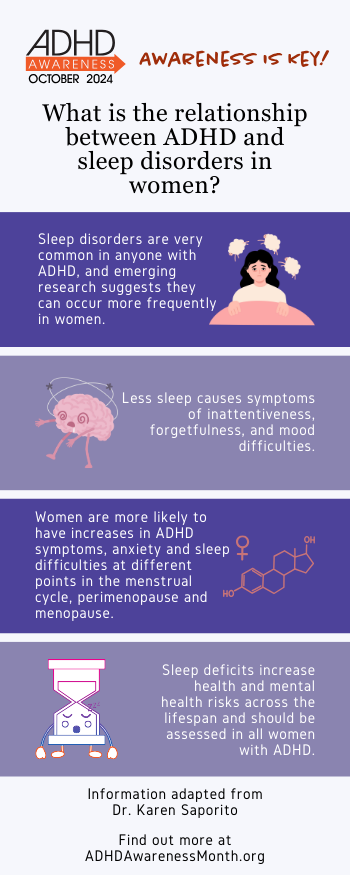Sleep disorders are very common in anyone with ADHD, and emerging research suggests they can occur more frequently women. Sleep problems make ADHD symptoms worse and ADHD symptoms and behaviors affect sleep.

Recent studies show that sleep disorders occur at much higher rates in the ADHD population, with more women being diagnosed and medicated for sleep. Sleep disorders such as insomnia, delayed circadian rhythm, sleep apnea and restless legs syndrome interfere with sleep, and less sleep causes symptoms of inattentiveness, forgetfulness, and mood difficulties. In addition, people with ADHD are more likely to struggle with behaviors that affect sleep, such as consistent bedtime routines, regular exercise, substance use, and too much screen time.
Women have a lot of organizational demands in families and women with ADHD often struggle with time management. Women are also more likely to have increases in ADHD symptoms, anxiety and sleep difficulties at different points in the menstrual cycle, perimenopause and menopause, which in turn all affect sleep.
Sleep deficits increase health and mental health risks across the lifespan and should be assessed in all women with ADHD.
About the Author

Dr. Karen Saporito is a licensed clinical psychologist who has been in private practice for over 25 years. She provides care to a wide range of clients with varying issues and has a particular interest and specialty in diagnosing and supporting children and adults with ADHD and autism spectrum disorder. She is passionate about educating medical and mental health providers, as well as clients, about the different presentation of girls and women with neurodevelopmental disorders. Karen has been a member of APSARD for several years, with involvement in diversity and equity issues, as well as being co-chair of the ADHD in Girls and Women Special Interest Group.
Resources
Ahlberg R, Garcia-Argibay M, Taylor M, et alPrevalence of sleep disorder diagnoses and sleep medication prescriptions in individuals with ADHD across the lifespan: a Swedish nationwide register-based studyBMJ Ment Health 2023;26:e300809.
Eng AG, Nirjar U, Elkins AR, Sizemore YJ, Monticello KN, Petersen MK, Miller SA, Barone J, Eisenlohr-Moul TA, Martel MM. Attention-deficit/hyperactivity disorder and the menstrual cycle: Theory and evidence. Horm Behav. 2024 Feb;158:105466. doi: 10.1016/j.yhbeh.2023.105466. Epub 2023 Nov 30. PMID: 38039899; PMCID: PMC10872410.
